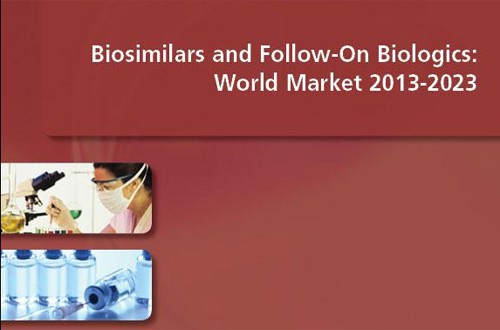
The global market for biosimilar medicines will reach $2.45bn this year, according to a new report.
Visiongain’s Biosimilars and follow-on biologics: world market 2013-2023 claims that the market for the products will grow by 20 per cent from 2012.
This would mean biosimilars – biological medicines that are developed to be identical to an approved biologic – would account for 2 per cent of the overall market for biological drugs.
This growth is expected to continue up to 2023, and will be driven by a greater number of companies expanding into biosmilars; patent expiries for blockbuster biologics; growth in established biosimilar regions, such as China, and an improved regulatory environment that will make it easier and faster to bring biosimilars to market in the US and Europe.
The most immediate benefits from this will be seen in established biosimilar players, such as Celltrion and Hospira, according to the report.
Celltrion has already launched a biosimilar version of Johnson & Johnson’s (J&J) monoclonal antibody Remicade (infliximab) in South Korea, and has filed for approval in other regions – including Latin America and the EU.
Hospira gained the first European approval for a biosimilar in 2007 for its version of Amgen and J&J’s anaemia drug Procrit (epoetin alfa), and currently has a filing under consideration for its own version of infliximab.
Visiongain’s report predicts that infliximab is part of a trend for biosimilar monoclonal antibodies, with other potential branded drug targets include Roche’s oncology treatments Rituxan/MabThera (rituximab) and Herceptin (trastuzumab).
And in 2012, Teva’s biosimilar version of Novartis’ monoclonal antibody Glivec (imatinib) was recommended by the EMA for use in the treatment of leukaemia.
Similarly, biosimilar insulins are also expected to be a big target for companies, as evidenced by Mylan’s collaboration with Biocon to commercialise the Indian biotech firm’s versions of Sanofi’s Lantus, Lilly’s Humalog and Novo Nordisk’s NovoLog.
Combined, biosimilar monoclonal antibodies and insulins are expected to account for 57 per cent of the global biosimilars market by 2023.
EMA to update biosimilars guidelines
Regulatory bodies are paying attention to the growth of biosimilars too, and the EMA has issued draft revised guidelines on biosimilars to help speed products to market.
The EU is lagging behind other regions, such as Korea, and the new guidance is intended to provide clarification on terminology for biosimilars; give better clarity on the principles of biosimilarity, including on their safety and efficacy aspects; and to clarify requirements regarding the dosage, route of administration and formulation of biosimilars.
The EMA is inviting comments on the draft guidelines up until October 31, 2013.




